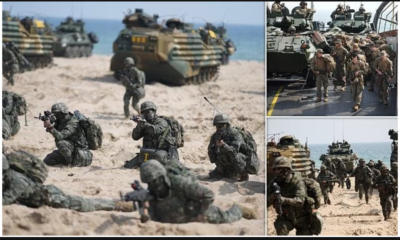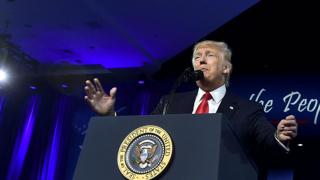Foreign
Trump To Skip Correspondents’ Dinner As Media Row Heats Up
President Donald Trump ratcheted up his feud with the US media Saturday, announcing he will skip the annual correspondents’ dinner one day after a row erupted over White House press access.
By boycotting the event Trump breaks a tradition that began in 1921 in which journalists invite the US president for a light-hearted roast.
The last time a president missed the event was in 1981, when Ronald Reagan was recovering after being shot in an assassination attempt. Reagan however phoned in with friendly remarks.
Richard Nixon, who despised the media, skipped the event in 1972.
Over the years the dinner organized by the White House Correspondents Association has evolved — or devolved, depending on one’s point of view — into the self-described “Nerd Prom” packed with Hollywood celebrities.
“I will not be attending the White House Correspondents’ Association Dinner this year. Please wish everyone well and have a great evening!” Trump wrote on Twitter.
Trump built his campaign on blasting the mainstream US press, and as president has intensified his media-bashing.
The WHCA said it will proceed with this year’s dinner, set for April 29.
The event “has been and will continue to be a celebration of the First Amendment [on freedom of the press] and the important role played by an independent news media in a healthy republic,” WHCA president Jeff Mason tweeted.
Some news groups have already pulled out. Conde Nast, publisher of The New Yorker and Vanity Fair magazines, will be absent, and Bloomberg will no longer co-host a popular post-dinner party.
According to Buzzfeed News, CNN is debating whether to also pull out.
The New York Times has skipped the event for years to avoid charges that its reporters are too close to the White House.
Comedian Samantha Bee earlier announced she is hosting that same night at a nearby hotel an event titled “Not the White House Correspondents’ Dinner” to raise money for the Committee to Protect Journalists.
– “Protesting strongly” –
Trump’s cancelation comes one day after the White House denied access to an off-camera briefing to several major US media outlets, including CNN and The New York Times.
Smaller outlets that have provided favorable coverage however were allowed to attend the briefing by spokesman Sean Spicer.
The WHCA said it was “protesting strongly” against the decision to selectively deny media access.
The New York Times said the decision was “an unmistakable insult to democratic ideals,” CNN called it “an unacceptable development,” and The Los Angeles Times warned the incident had “ratcheted up the White House’s war on the free press” to a new level.
Speaking Friday at the annual CPAC gathering of conservative activists and politicians, Trump slammed the mainstream US media as “the enemy of the people,” and labeled the fourth estate “fake news” and the “opposition party.”
Trump’s chief strategist Steve Bannon, a former head of the right-wing news site Breitbart, predicted earlier at CPAC that relations with the media would only get worse as the president rolls out his agenda.
– ‘Unwise’ –
It is not uncommon for Republican and Democratic administrations to brief a limited number of reporters on specific themes.
However Friday’s White House event was initially billed as a regular briefing open to credentialed media before it became a closed event in Spicer’s office for a cherry-picked group of participants.
Several outlets that regularly cover the White House, including newswires Reuters and Bloomberg, attended. They are part of the “pool,” a small group of reporters who have access to certain events and share the contents with other media.
The Associated Press boycotted the event in protest at the exclusions, which included The Los Angeles Times and Politico.
AFP was not included despite being part of the press pool. Its journalist protested, and attended the briefing uninvited.
During the off-camera briefing, Spicer said that the White House has shown an “abundance of accessibility… making ourselves, our team and our briefing room more accessible than probably any previous administration.”
He gave no explanation for the media selection.
As protests erupted over the incident, a December interview re-emerged in which Spicer told Politico that the Trump White House would never ban a news outlet.
“Conservative, liberal or otherwise, I think that’s what makes a democracy a democracy versus a dictatorship,” he said.
Ari Fleischer, a former George W. Bush spokesman, said he viewed the White House’s stance as “unwise and counterproductive,” but also argued for Friday’s incident to be kept in perspective.
“Press secretaries need to meet with the whole press,” Fleischer told CNN. “But beyond that, there is nothing unusual about presidents meeting with selected reporters, and White House staffs do it all the time too.”
Follow us on social media:-

 Celebrity Gossip & Gist16 hours ago
Celebrity Gossip & Gist16 hours ago“I will not stop kissing in movies because I’m married, same with my wife, marriage is not slavery” – Fredrick Leonard Lament
-

 Celebrity Gossip & Gist16 hours ago
Celebrity Gossip & Gist16 hours ago“Na you snatch husband, na you nor get peace of mind” – Verydarkman calls out Judy Austin over her displays of affection towards Yul Edochie
-

 Foreign16 hours ago
Foreign16 hours agoChina sanctions US firms over Taiwan military support
-

 News15 hours ago
News15 hours ago“You abandoned 4 children for me for the past four years” – Nigerian woman cries as she calls out estranged husband

